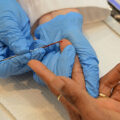
FAMILY FEATURES
About 38% of American adults have high cholesterol, which can be caused by poor lifestyle habits or genetics, according to the Centers for Disease Control and Prevention. Having a high low-density lipoprotein (LDL) cholesterol number — considered “bad” cholesterol — can contribute to fatty buildups (plaque) and narrowing of the arteries.
LDL cholesterol is also the type of total cholesterol most closely associated with an increased risk for a heart attack or stroke. In fact, 75% of heart attack and stroke survivors reported having high cholesterol, according to a Harris Poll survey conducted on behalf of the American Heart Association, yet less than half (49%) prioritize lowering their cholesterol.
“There’s a pervasive lack of public awareness and understanding around bad cholesterol and its impact on your cardiovascular health,” said Joseph C. Wu, MD, Ph.D., FAHA, American Heart Association volunteer president and director, Stanford Cardiovascular Institute and Simon H. Stertzer, MD, professor of medicine and radiology at Stanford School of Medicine. “As bad cholesterol usually has no symptoms, we often find that many patients are walking around without knowing they’re at risk or how to mitigate it.”
To learn about LDL cholesterol, its impact on heart health and the steps you can take to maintain a healthy number, consider this information from the Lower Your LDL Cholesterol Now initiative, nationally sponsored by Amgen.
Get to know your LDL number
According to the survey, nearly half (47%) of heart attack and stroke survivors are unaware of their LDL numbers. While cholesterol levels can vary by race and ethnicity, with higher levels of LDL seen most often among Asian men and Hispanic women, various research studies on LDL have shown “lower is better.”
For healthy adults an LDL at or below 100 mg/dL is ideal for good health. If you have a history of heart attack or stroke and are already on a cholesterol-lowering medication, your doctor may aim for 70 mg/dL or lower. In addition to race and ethnicity, family history, age, sex, tobacco use or exposure to secondhand smoke, eating habits, lack of physical activity, heavy alcohol usage and obesity can impact LDL numbers.
Understand how often to check your numbers
Because high LDL does not typically cause symptoms, it’s important to have your number checked by your health care professional. Ask your doctor for the right frequency for you. Generally, healthy adults ages 20-39 should have their cholesterol checked every 4-6 years. Adults over age 40, or those who have heart disease (including prior heart attack) or other risk factors, may need their number checked more often.
Learn risks associated with LDL
Too much LDL cholesterol can lead to a buildup of fatty deposits inside your arteries — a condition known as atherosclerosis — which can narrow arteries and reduce blood flow. If a piece of the plaque breaks free, it might travel into the bloodstream and block a blood vessel to the heart or brain, causing a heart attack or stroke. This narrowing also elevates the risk of peripheral artery disease.
Take steps to manage high LDL
Managing high cholesterol is not one size fits all. Talk with your healthcare professional to map out the right treatment plan for you. According to American Heart Association guidelines, lifestyle habits can help control your cholesterol, including eating a healthy and balanced diet (emphasizing fruits, vegetables, nuts and seeds, lean protein, and fish)
- Staying active and aiming to get at least 150 minutes of moderate activity each week (such as brisk walking)
- Managing stress
- Eliminating tobacco use
However, some individuals, especially heart attack and stroke survivors, should have a conversation with their doctor about cholesterol-lowering medications.
Talk to your doctor about getting your cholesterol tested and visit heart.org/LDL for more information.
Photos courtesy of Shutterstock
Source: American Heart Association

















Leave a Comment